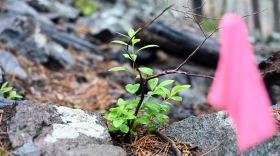-
Vineyard Wind joins in as second project wins court relief
Two offshore wind projects have now secured preliminary injunctions enabling work to resume, and now Vineyard Wind 1 is also going to court in search of relief from a federal government stop-work order. -
Finding the good environmental news after a year of costly climate disasters
In this environmental roundtable, experts dive into last year’s costliest climate disasters and a bit of good news in Boston Harbor. -
Biologists identify these bats by their toe hairs. They’re key to Massachusetts’ ecology.
GBH News tagged along with scientists to a top-secret location where they’re trying to protect these misunderstood mammals. -
After last year’s fire, volunteers track new life at Blue Hills
Enthusiastic citizen scientists are hiking in each month to document what’s coming back. After more than 40 acres burned, now, there’s a diverse array of plants and birds. -
EPA employee fired after signing letter of dissent opposing deregulation
EPA engineer Lane To shares their story with Craig LeMoult after being fired for signing a letter critical of agency deregulation under the Trump administration. -
Acadia will stay (mostly) open during government shutdown
Even though Acadia National Park will stay open during the federal government shutdown, there will be changes to the usual visitor experience. -
She raised a cheetah cub in the ’70s. Now, she’s saving them from extinction.
With fewer than 7,000 cheetahs left in the wild, Dr. Laurie Marker has spent decades building programs around the world to protect them while supporting the communities around them. -
Bye-bye beetle? Massachusetts is close to eradicating an invasive bug.
The Asian longhorned beetle can munch on trees until it kills them. The state has spent nearly two decades surveying over 8 million trees for the destructive insect. -
Massachusetts ecologists build a winter ‘hotel’ for snakes
The success of the rocky structure will be measured once temperatures drop. -
How is climate change impacting New England’s marine life?
“Just about every day, we’re hearing about unusual sightings,” says John Durbin, a senior scientist with the Anderson Cabot Center for Ocean Life at the New England Aquarium.









